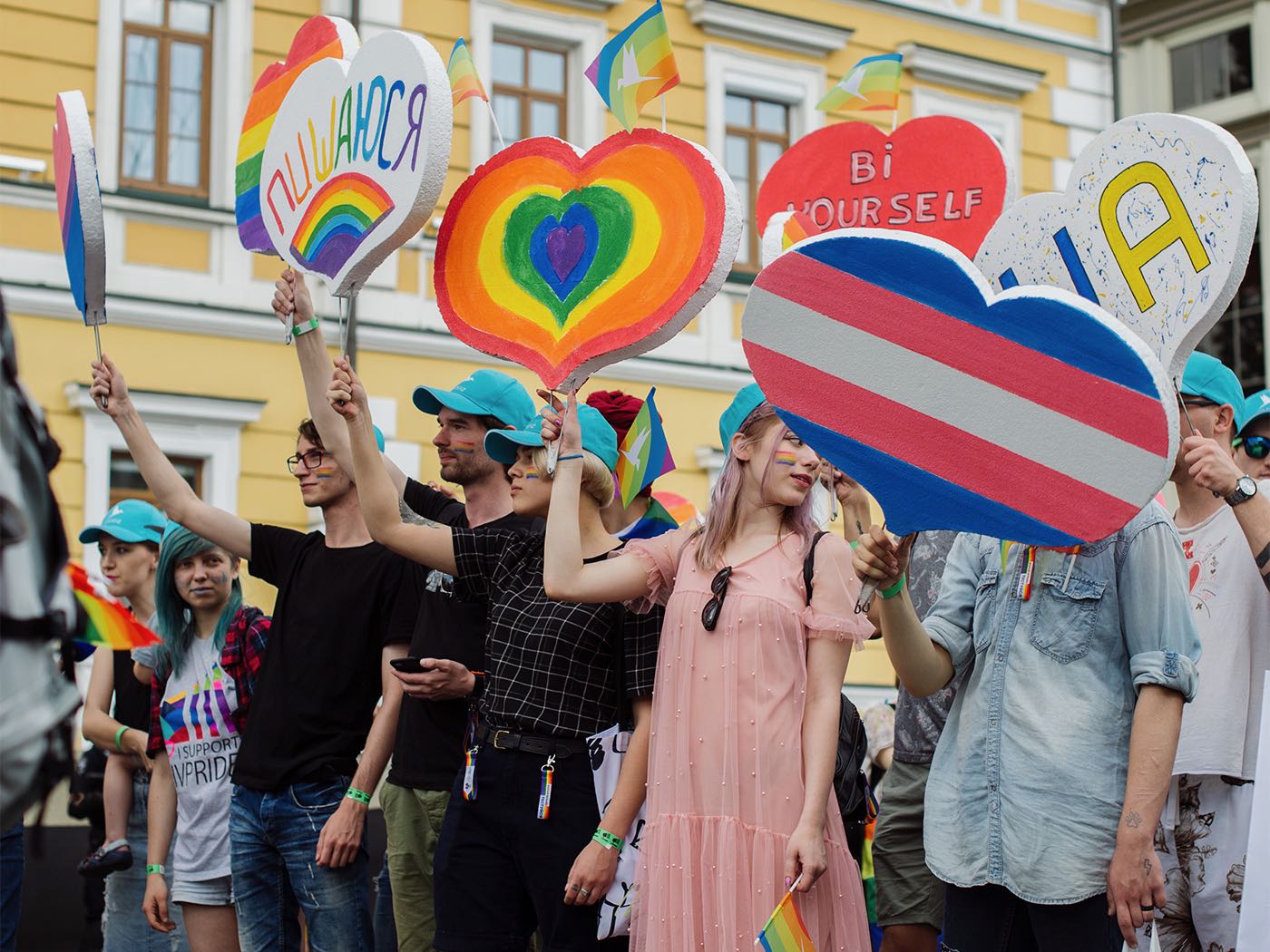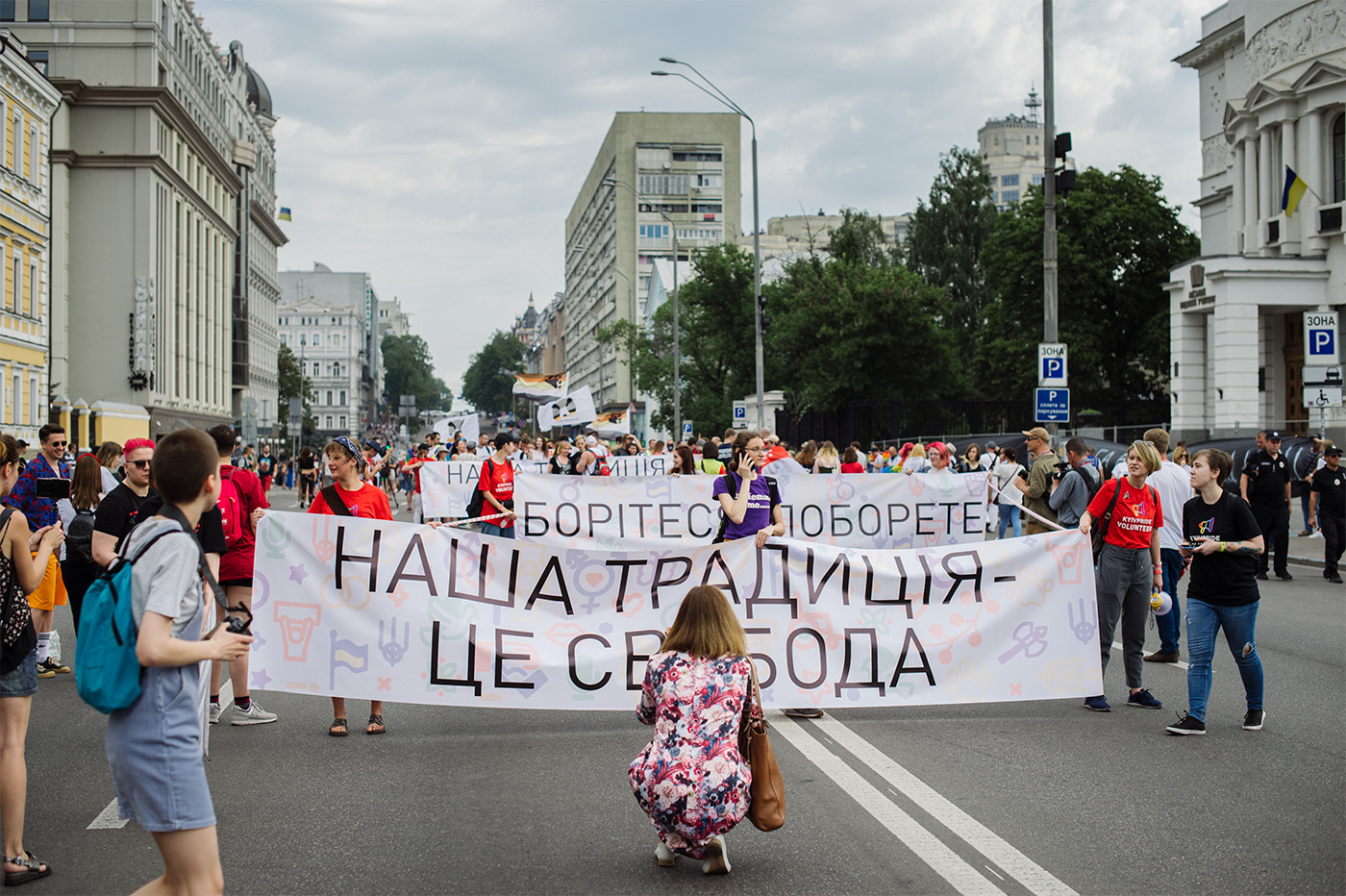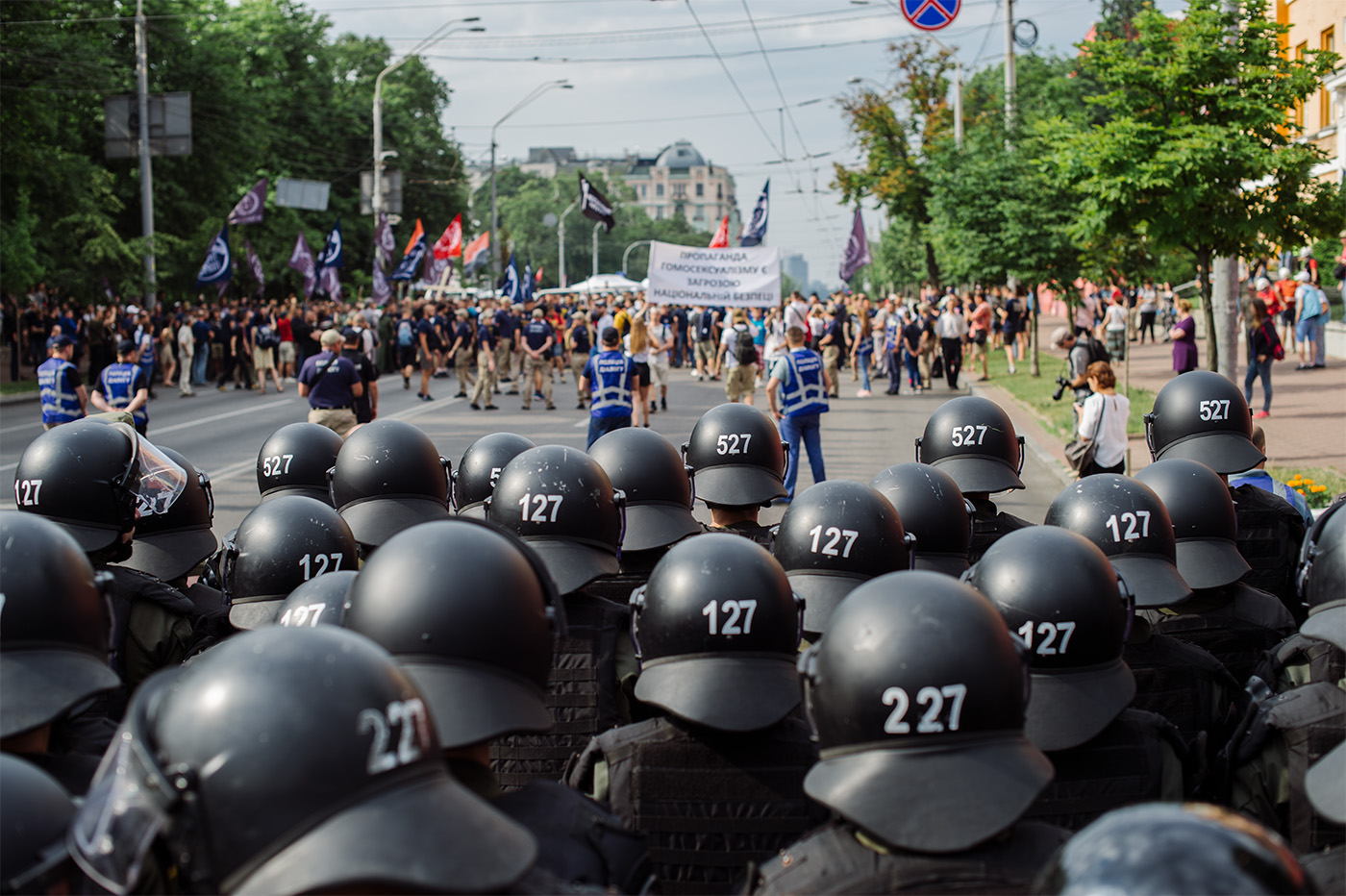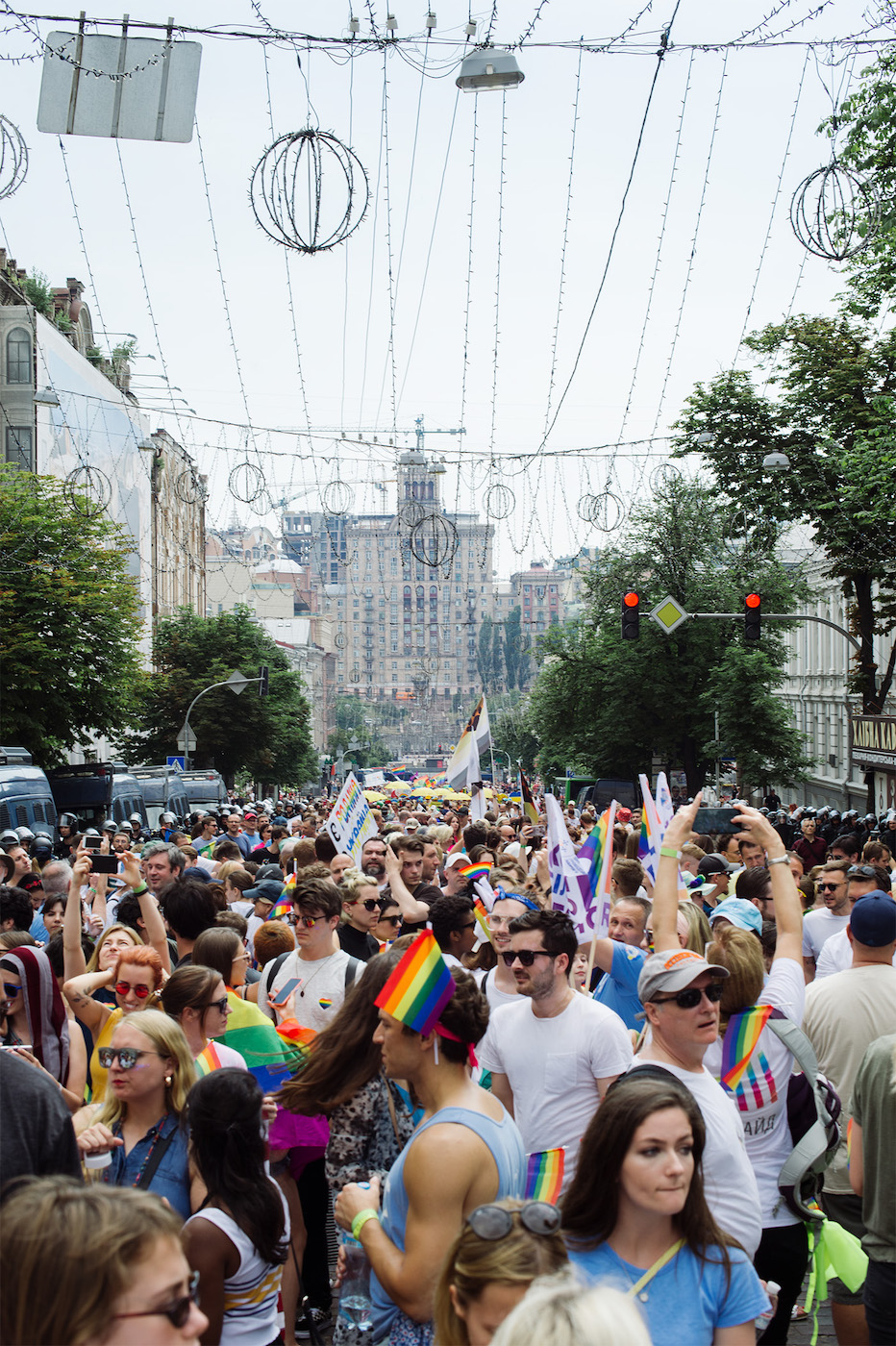
In December 2004, I was one of 500 volunteers Canada deployed to be election observers in Ukraine during the Orange Revolution. In 2014, the constantly changing political situation in Ukraine lured me back. I did two more monitoring missions, both times in western Ukraine near the oblasts (provinces) where my grandparents and great-grandparents came from. This made me curious about my ancestral homeland. So, in 2016 I decided to go on a roots expedition to Ukraine with my son, Paul. I saw beautiful landscapes and met lovely people. I wasn’t expecting to be drawn into a social-justice movement.
In 2002, our eldest son, Carl, came out as gay when he was in high school. In 2004, Carl started one of the first gay straight alliances (GSA) in Canada. A year later the same-sex marriage debate in our country threw me into activism. I attended protest rallies, spoke at town hall meetings, did media interviews and wrote letters to legislators and opinion pieces in the newspaper. I marched in Pride Parades and was even the interim treasurer of the Pride Centre of Edmonton. My husband and I were the Edmonton Directors of PFLAG (Parents, Families and Friends of Lesbians and Gays) for seven years. Every month we heard from families who had been torn apart by strict application of religious dogma. Although not everything went smoothly for our family, we did not suffer heartbreak or tragedy.
I had to tell our story to give hope and comfort to families who found themselves in similar situations. In 2011, I began writing a book about the experiences I had as a result of having a gay son. My book, A Family Outing, was published by Cormorant Books in 2016.
I had grown curious to know if there was a PFLAG equivalent in Ukraine. Before I left on the roots trip in 2016 I found an article in a Washington, D.C. gay magazine about Olena Hloba, a woman in Kyiv who had organized TERGO, a group for mothers who had gay children.

I contacted Olena to tell her about my work with PFLAG Edmonton and my book. She immediately got back to me and we had several exchanges about LGBTQ+ issues in Canada and Ukraine. Olena and I arranged to meet in Kyiv a few months later. Olena set up meetings for me in Kyiv, Lviv and Ternopil, where I met with Canadian Embassy staff, LGBTQ+ activists, human rights and crisis workers, mothers and gay youth, and had an interview at Hromadske Radio in Kyiv.
To make sure things would go smoothly for Paul and me in Ukraine I turned to Yarema, who had been one of my election monitoring drivers, to help confirm the names and locations of the villages I believed my family was from and to accompany me as I met with the LGBTQ+ community in Ukraine. Yarema became our fixer. He knew the customs and met people easily.
At each appointment I read translated excerpts from my book in Ukrainian, about Carl coming out to me, my telling my 82-year-old mother that she had a gay grandson and a third passage telling parents that they were not alone in their worries, fear and despair. People asked about my gay son’s life, organized religion in Canada and our family. I spoke about the slow, often demoralizing struggle that the LGBTQ+ community endured to accomplish its gains in Canada. At each event I heard how independence had released Ukrainians from communist oppression only to have the Orthodox and Catholic churches step in to control thinking and destroy gay people’s lives. Families in Ukraine, just as in Canada, were being torn apart because of religious convictions.

The address we were given did not exist. After multiple unanswered phone calls Yarema finally got through to the Centre. Half a block away a woman waved, motioning for us to follow her through an overgrown lot to the back of a building. Underneath a rusted metal staircase, two uneven steps led down to a faded burgundy metal door. There were no numbers on it, no rainbow stickers or flags anywhere. Our guide led us into a large meeting room where about 25 young people scuttled to their seats as I was directed to the front of the room.
I told the group about my book and Carl’s life in Canada where he can marry the man he loves and adopt children. They listened and were excited, even giddy, to hear that Carl could be himself and live openly without fearing for his own safety. The gay youth wanted me to tell them how to talk to their parents. Their faces were awash with tears when I read the section in my book about Carl’s coming out to me the day he came to my office when he was 16 years old. They beseeched me to find a way to get my book translated into Ukrainian so they could have something to give to their families.
A couple of days later, it was raining and already dark when we arrived in Ternopil just after 7 p.m. The rhythmic sweep-thud, sweep-thud of the car’s windshield wipers made for a spooky soundtrack as we again searched for the meeting location. The streets were empty except for the silhouette of four ghost-like figures huddled together beside a line of parked cars. It felt like we were in a James Bond movie. Yarema parked the car and flipped open his little blue Nokia cellphone. The four men standing in the rain turned out to be our contacts. During a 15-second walk to a pub to get out of the rain two of the men vanished. The remaining two men were crisis workers who provided clothes and an evening meal for orphaned homeless children.
They told me the children had nowhere to sleep and that many were sexually abused gay kids.
The kids and young adults had little or no family support, and no one at their schools helped them.
In Lviv, we met more activists and a TERGO mother, and attended a flash mob where a dozen young people held up large rainbow-coloured sheets of Bristol board for a photo op in front of the Lviv Town Hall. We met an activist with an equal sign tattooed on the back of his hand who was determined to change social structures and legislation through education and lobbying the government. He dismissed the flash mob as futile and said the participants risked getting hurt for no gain. Four skinheads turned up at the flash mob as everyone dispersed.

We called the police when two skinheads followed a group of girls to a nearby coffee shop. A couple of minutes later we directed two police officers to the coffee shop and got out of there.
That fall, Olena invited me to speak at the 2016 Second International Conference of Parents of LGBTQI Citizens in Kyiv. In her opening remarks she said in English, “Accepting LGBTQI-people and advocacy for their rights remain highly sensitive and challenging areas of our life.”
Using words like “highly sensitive” and “challenging” understated the constant threat she and others faced in their work. Part of her conference planning included whether or not to have armed security personnel at the hotel. She did not book extra security. In the hotel lobby a presenter from Malta said the international visitors had not been adequately briefed about the potential danger they faced in attending this conference. In the end, there were no incidents or threats that we knew of.
I presented two sessions, one about the formation of gay straight alliances in Canadian schools and another on how the United Church of Canada came to celebrate the marriage of same-sex couples. TERGO mothers from across Ukraine, and men and women from Europe then approached and encouraged me — with some pressure — to get my book translated into Ukrainian. This included Russian attendees. Once back to Edmonton, I decided to dedicate myself to this task.
It took me two years to get my book translated and published in Ukraine. For the launch and book tour I travelled back to Ukraine with my son Paul, an editorial photographer. We again partnered with Yarema, who accompanied us as we travelled to Kyiv, Odesa and Lviv to promote the book. Andrii, my publishing editor at Krytyka Press, met us at our hotel in Kyiv with eight stitch bound copies of Сімейна цінність: спогади мами ґея, (Family Value: Memoir of a Mother of a Gay Son). It was to be officially launched as part of Kyiv Pride 2019.
When we arrived for the book launch it was Pride Week but there were no signs, banners, painted crosswalks or decorated windows anywhere in Kyiv. The Pride program was posted online with no addresses listed for any of the events. To prepare us for the Equality March (which I naively assumed would be like our pride parades in North America) the head of Kyiv Pride gave us a security briefing. We were not to wear anything that would identify us as LGBTQ+ supporters. No rainbow pins, scarves, bracelets, t-shirts, banners, flags or tote bags were to be visible as we made our way to the marshalling area. Only when we were safely inside the “guarded area” could we bring out flags and banners and pull on a T-shirt. At the end of the march we were to remove and hide anything that would identify us as having participated in the march and then scatter randomly. The subway stations along the route would be closed off for several hours before, during and after the march. Participants who needed to use trains were directed to a specific station where they would be loaded onto trains and taken to random locations. From there, busloads of participants would be driven to other stations where they could board trains bound for their final destinations. Only then did it dawn on me that this was going to be a civil rights march — not a parade with floats and corporate sponsorship.
Family value was presented as the central piece of a two-and-a-half-hour long panel discussion on human rights in Ukraine. The panelists included the then-Canadian Ambassador to Ukraine, Roman Waschuk. Andrii said, “Persecution of the gay community has replaced the persecution of Jews,” and predicted that this discrimination would last as long as it took for a new minority to be targeted.
Back at the hotel Paul and I moved around in silence as the magnitude of what we were doing sunk in. I shuffled things around in my luggage. Paul lay on his bed staring at his phone. After two and a half hours of sleep we met Yarema for breakfast, then walked to the marshalling area in front of Shevchenko University.
The streets were empty on Sunday, June 23, at 8 a.m. In the distance uniformed security guards stood in clusters beside an eight-foot-high chain link fence. Police on horseback formed a barricade behind a wide wall of even more police in riot gear standing shoulder-to-shoulder across a six-lane road. They stood face-to-face blocking 1,000 neo-Nazis who were carrying posters and banners with hateful messages.
The March started on time. We walked side-by-side, six people across, protected by armed police on either side of us who gripped the right shoulder of the officer in front of them with their left hand. Every doorway had uniformed security personnel stationed in it. Military trucks blocked cross streets and back lanes so no one could crash through the lines. Over 8,000 marchers from Ukraine and around the world were surrounded by 5,000 police and security personnel who were there to protect us from the neo-Nazis.
I counted fewer than 20 people watching from their balconies. There was no PA system blaring “We Are Family.” It was an eerily quiet, intense demonstration of solidarity for an international human rights cause. We marched in a 10-block square.
Yarema stood to the side, smoking, with a huge smile on his face. “I’m so proud of my country today. All these people and there was no violence.”
The rest of the Canadian Embassy contingent, including Paul, me and six plainclothes RCMP officers, quickly took off our maple leaf Pride Canada T-shirts and stashed them away in our backpacks. We glanced at each other, relieved that we weren’t attacked and worried about what danger could be waiting for us outside the marshalling area. A few of us went for lunch at a nearby cafeteria and sat in silence staring at our food.
A few hours later we took an overnight train to Odesa that arrived at 6 a.m. Ivan from LIGA, the Odesa gay and lesbian centre, met us on the street. He led us through a rundown courtyard that was bathed in amber sunlight. Our luggage wheels clattered on the shifted cobblestones as we dragged our suitcases full of clothes and books to a set of rickety metal stairs that led to another unmarked door in another concealed location.
At my first event, a 60-minute interview at First City Radio Odesa, the interviewers moved effortlessly between Ukrainian and Russian and Yarema translated. An hour later we were back at LIGA. A small meeting room with a wall of windows overlooking a treed courtyard was already filling up with mostly young people in their 20s and 30s. I recognized Nadia, a TERGO mother, from when we met at the 2016 Kyiv conference for parents. I welcomed everyone, told them about my book and read a couple of short excerpts. They asked about Carl’s life, same-sex marriage, adoption and the differences between LGBTQ+ acceptance in Canada and the United States. I invited Nadia to join the discussion. She told us that for years she did not accept that her son was gay. When his partner committed suicide she suddenly realized that her son could be next if she didn’t change her thinking. Yet again I heard stories of families disowning their children and more examples of proselytizing Catholic and Orthodox priests who condemned same-sex partnerships and warned their parishioners about the sinning LGBTQ+ community that’s out to convert innocent children to homosexuality. I listened, congratulated them on their human rights accomplishments and told them how much I honoured their bravery and perseverance. I posed for group photos and signed books.
I was haunted by memories from my first meetings in May 2016 with the Ukrainian LGBTQ+ community and their allies, especially the six TERGO mothers in Kyiv who sat in a semi-circle trying not to make eye contact. One said her son had been jailed four times for being gay, once for three months. He fled to America and hadn’t been home in over a year. Another had a transgender child. Their children were persecuted and some were tortured. All of the women said that they had no friends and that their husbands did not accept their children. There was nowhere to turn and there was no one to help them. The TERGO meeting was the only place where they found a few moments of comfort and companionship. They were demoralized, defeated and in despair. My biggest shock came when I asked them what they were most afraid of, thinking that the day-to-day safety of their children would be their greatest concern. Their answer surprised me at the time but now makes perfect sense. They simultaneously responded, “Putin.”
But, by 2019, TERGO had established chapters in many parts of Ukraine and had organized international conferences intended to formalize ties and build partnerships with other LGBTQ+ parent groups in Europe. FULCRUM, an NGO that advocates for the rights of the LGBTQ+ community, had united LGBTQ+ organizations throughout Ukraine. The Department of Education in Odesa had committed to address bullying of LGBTQ+ students in schools. There were out-of-the-way LGBTQ+ pride centres in several cities, and at least two radio stations ran LGBTQ+ news and programming.
Human rights workers, activists and legislators had moved LGBTQ+ issues and rights forward in Ukraine. Sexual activity between consenting adult same-sex partners was no longer illegal. Legislation was passed banning discrimination in the workplace based on sexual orientation and gender identification. Kyiv Pride had celebrated its fifth anniversary. The Equality March with over 8,000 participants went off with no violence. And, I had “made history in Ukraine” with the translation and launch of Сімейна цінність: спогади мами ґея, according to Jars Balan, the former director of the Canadian Institute of Ukrainian Studies at the University of Alberta. The year before, Maya and Her Moms, a children’s picture book about a same-sex couple, had been pulled from a Lviv Book Fair when nationalists and religious groups threatened violence at the event. Because of the real potential for backlash Сімейна цінність: спогади мами ґея would be available through online orders only.
What will life be like for the Ukrainian LGBTQ+ community after the war? A June 2022 survey conducted by Nash Svit (Our World), an LGBTQ+ human rights centre, showed a shift in attitudes. Nearly 64 per cent of Ukrainians support full equality for people of different sexual orientations. In a response to a June 2022 petition with 28,000 signatures in support of legalization of same-sex marriage, Ukrainian President Volodymyr Zelenskyy suggested pursuing civil partnerships which would provide some protection for LGBTQ+ rights.
Putin’s full-scale invasion of Ukraine has united Ukrainians against Russia. Today in Ukraine members of the LGBTQ community are fighting side-by-side with the citizens of their country. Inna Iryskina, Trans Program Coordinator at Insight, an NGO that has shelters in Lviv and Chernivtsi, wrote to me saying, “…. some of them [members of the LGBTQ+ community] are on the frontline now and taking action in the battles against Russian occupants.” Ostap Ukrainetz, one of the translators of my book, wrote to me saying the war has “changed the hierarchy of fear.” Ukrainians seek shelter as Russian missiles and bombs destroy their homes and level entire cities, killing civilians. Ukrainians are fighting for their survival. Worrying about being attacked because you are gay has been replaced by the consequences for everyone of the daily horrific destruction wreaked by Russian forces.
We speak with Yarema and his family regularly. At first there was no question, they were staying in Ukraine. When the war stretched on, the family spent a short time in France. Everyone wanted to go home after a couple of months so they headed back in mid-summer. The children describe air raid sirens going off and their windows rattling during bomb blasts as matter-of-factly as my kids would have described a prairie thunderstorm. Power outages are frequent and last anywhere from a few hours to several days. Yarema described the panic he felt when all the phone lines were down. He was driving one of his children to school when he heard explosions nearby. He pulled over to the side of the road to wait for the shelling to stop. He tried to call home but there was no phone service, anywhere. He had no way of contacting his family and couldn’t turn around to drive home while there were bombs exploding around him. That day there were seven bomb blasts. And still they stay.
Since the invasion I’ve met displaced people from eastern Ukraine who are now living in Edmonton. Their families have been torn apart. They want to go home but their towns and cities are destroyed. From Ukraine, Yarema tells us, “We are ready to survive. We have wood, a generator, food, candles and gas. This is our home. The war will end and we will rebuild our country.” For LGBTQ+ Ukrainians, the consequences are even more dire. A victory for Putin would spell the end of any rights gained since independence and condemn them to an uncertain, dangerous future.












